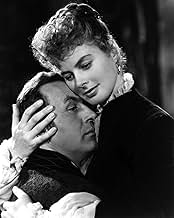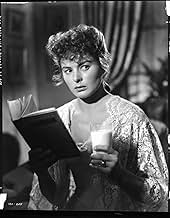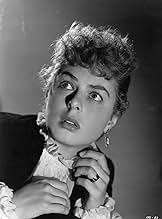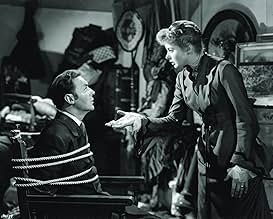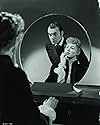Dix ans après que sa tante a été assassinée dans leur maison de Londres, une femme revient d'Italie pour reprendre la résidence avec son mari. Son intérêt obsessionnel pour la maison découle... Tout lireDix ans après que sa tante a été assassinée dans leur maison de Londres, une femme revient d'Italie pour reprendre la résidence avec son mari. Son intérêt obsessionnel pour la maison découle d'un secret qui peut rendre sa femme folle.Dix ans après que sa tante a été assassinée dans leur maison de Londres, une femme revient d'Italie pour reprendre la résidence avec son mari. Son intérêt obsessionnel pour la maison découle d'un secret qui peut rendre sa femme folle.
- Réalisation
- Scénario
- Casting principal
- Récompensé par 2 Oscars
- 10 victoires et 7 nominations au total
- Miss Thwaites
- (as Dame May Whitty)
- Policeman
- (non crédité)
- Young Girl
- (non crédité)
- Cab Man
- (non crédité)
- Pedestrian
- (non crédité)
- Pedestrian
- (non crédité)
Avis à la une
Great performances all round.
Indeed, enduring the psychological torture he applied to his love-seeking wife Paula, played by an emotionally versatile Ingrid Bergman, was such an infuriating experience that I left almost one decade between the first and the second viewing, and I literally tiptoed to the DVD to force myself to refresh my memory. After the first fifteen minutes, just when I thought I could stand it, I realized that any horror movie would have been more supportable... or am I overreacting?
I think there must have been some strong reaction toward that novelty of a plot where a person drove another one insane through mental manipulation to the point that "gas light" became part of common language... that's how impactful it was. Not many movies deal with that particular device, but this is how "Gaslight" was revolutionary and sophisticated in a twisted way, suiting the emerging noir genre.
The "gas light" effect referring to the dimming of the light that made Paula believe she was going crazy isn't effective on a narrative level because it's driven by a fact but rather by the seeds of doubt it sows on her mind. We know for a fact that a woman is being manipulated but only suspicion can heal her from her husband's cruel dominance.But she can't suspect him because she loves him in a way that echoes Stockholm Syndrome and he's a Machiavellian gourmet who knows exactly the amount of cruelty and suavity to apply.
Charles Boyer's with all these cunning eyes, that mouth always wary about not letting a word slip, and his faux-affable "French lover" manners, elevate his characters to summits of vileness and gaining extra altitude by a symmetric effect with Ingrid Bergman who brings an extraordinary level of pathos while maintaining a strange aura of dignity. This is a woman whose heart and mind are slowly shred to pieces but she's resigned to believe any word of her beloved husband because she can envision anything except such capability of vileness.
Why would the gaslight dim every night? Why would she hear noises the servant doesn't notice and why would Gregory be wrong if the second maid wasn't so arrogant and defiant? Even Angela Lansbury in her screen debut is perfect in the role of Nancy, the street smart and slightly slutty maid whose deadpan and snarky attitude is more affecting than any hint of false empathy or true detachment. This is a free-spirited woman yet manipulated by the way Gregory exploits every element of the environment and every possible situation. So what we have is a conspiracy perfectly oiled where Cukor makes us witness the action while making us as powerless as Paula. We're like passive observers bound and gagged and undergoing the villain's sadism. In a way, if we consider anger as a brief madness, we're also being "gaslighted" by Cukor.
The mark of great films is to elicit strong responses; and watching "Gaslight" a second time reminded me of something I meant as a compliment after my initial viewing, I thought it was the most Hitchcockian non-Hitchcock film... and the presence of Dame May Whitty or Joseph Cotten play like interesting nods to "The Lady Vanishes" and "Shadow of a Doubt". In"Vanishes", the main protagonist was toyed with her own certitudes and lured into doubting her own sanity and "Shadow" is about a villain who's a close parent. "Gaslight" makes these two plot points converge beautifully but there is another Hitchcock classic it bears a kinship with: "Suspicion".
And I think I can now be more explicit about what bothered me with "Suspicion" and that makes "Gaslight" a superior movie. In "Suspicion", the husband's guilt was the central theme but worked as a double edged word, if he was guilty, then he left too many hints to be a believable villain, if he wasn't, it was anticlimactic. In "Gaslight", we know the villain from the start and we know he's good at hiding his vileness (the essence of 'gaslighting') and the frustration doesn't come from the act but the lack of suspicion, the point is the psychological struggle within a woman whose passion blinds her mind and endangers it, a woman who trades her self-esteem for the sake of the most harmful person she could ever meet.
"Gaslight" foreshadowed, no pun intended, the way film noir would dominate post-war cinema, at a time where many people were blinded by patriotism and driven to real madness by leaders who had contempt for them. "Gaslight" is also a marvel of film noir in its use of the nightmarish fog of London Victorian streets used as the perfect camouflage for a Jekyll/Hyde villain, and where d the walls of respectability of an ordinary house, hid the claustrophobic nightmare of a woman lost among so many useless items and trophies, being the most precious one of all... or the most disposable.
Boyer, Lansbury were all Oscar-nominated, but it was Bergman who won the first of her three Oscars and deservedly so. In what could have been a one-note performance she explores every possible shade of fragility, doubt and panic, disbelief and resignation, whiplash moods orchestrated by her evil husband until her shining moment at the end, perhaps one of the most satisfying cinematic rants, when the whole scheme of Gregory backfires in the most delightful way.
But I still wonder why he wasn't listed in AFI's Top 50 villains, the film made the "thrills" list but hey, who made the thrills?
This was not the first adaptation of Mr. Hamilton's play, although in our humble opinion, it is much better than the previous account, in part helped by the great cast that Mr. Cukor assembled to portray these characters. Thanks to the magnificent black and white cinematography by Joseph Ruttengerg and the musical score by Bronislau Kaper, the film ultimately rewards the viewer.
We are taken to No. 9 Thornton Square, at the start of the film. A murder of a famous opera singer has been committed. We watch as a young woman is taken away. Paula, is being sent away to Italy to recuperate from the tragedy she has just witnessed. The idea was for her to follow her aunt, the murdered diva's footsteps, but just listening to the young woman sing, one realizes opera is not going to gain a new star.
The young pianist, Greorgy Anton, who is seen at Maestro Gardi's home, seems to be in love with Paula; she, in turn, has fallen in love with this much older figure. They prepare to return to London and live in the house at Thornton Square. Paula, alas, is not too happy because of her traumatic experience there. Little by little we watch as Gregory, now in charge of the household, begins to terrorize his wife. The key seems to be hidden in the attic where all the things that belonged to the late diva has been stored.
A young man living near the Antons, Brian Cameron, takes an interest in what he sees is definitively wrong with the woman at No. 9, and takes things into his own hands. It's through this man's intervention that Paula is able to see all that has been inflicted upon her. Whatever Gregory has done, succeeded in giving Paula a deep sense of insecurity and fear.
Ingrid Bergman, who makes a magnificent Paula, was born to play this troubled woman. She is seen as a young girl at the beginning of the film, then as a blossoming beautiful woman and at the end she is transformed into a person afraid of her own shadow. One look into Ms. Bergman's eyes and we know what's going on in her mind. She conveys all the emotions convincingly. There's not a thing wrong with her performance.
Charles Boyer also makes a great Gregory Anton, a man who is duplicitous and sly, with a hidden agenda to get whatever he can out of poor Paula. Gregory is an evil man who will go to great lengths to get what he wants. Gregory Anton offered the actor one of his best characters. His chemistry with Ms. Bergman is wonderful.
The other supporting characters are well performed, especially by a young and interesting Angela Lansbury, who plays the parlor maid, Nancy. Joseph Cotten, on the other hand, seems to be out of character as Brian Cameron. His American accent ruins his appearance and we don't believe in him. Dame May Witty is about the sunniest one in this film.
"Gaslight" is an excellent way to spend the time in the company of Ingrid Bergman and Charles Boyer, thanks to the detailed production directed by George Cukor.
When Paula was younger, her aunt with whom lived with in Thornton Square in London was murdered by a strangler roaming the streets. Paula goes to stay in Italy, and some time later, meets Gregory. She and Gregory plan to marry, and after they do, they move to London, back to the exact house Paula lived in.
Not too long after, Paula starts to become "forgettful," as Gregory tells her. In fact, he tells her a lot of things...and she believes him. Then things she knows she had put somewhere or remembered doing seem nonexistent, and Paula is left to wonder if her sanity is in check. Then, many times, she starts hearing footsteps, and the gaslights are going down a lot. Is Paula going crazy, or is she being haunted by her dead aunt's spirit...or is it something far more sinister?
I liked this movie a lot. Ingrid Bergman and Charles Boyet were amazing. Bergman portrays her character's emotions to the point that you feel the same way she does. And Boyet is pure evil in this one. Many times watching this, I was thinking, "He is so terrible to her!" It was so psychological, how everything eveloped. The best scene in the whole movie took place at the reception, when Gregory tells Paula he lost his watch, and then finds it in her purse. Then she bursts into tears, and it was so absolutely amazing how the scene was pulled off. In fact, it was so subtle it was scary. You wouldn't expect a missing watch found in her purse to be such a big deal, but it is such a strong scene.
The one thing I didn't like about this otherwise nearly flawless movie was the climax. It was just too dull to me, and the only part I really liked was Paula's wicked sarcasm towards Gregory while they're in the attic. She truly did deserve the Best Actress Oscar for her acting, but nothing could mask the fact that the climax was just too weak. If it had a bit of a touchup, this movie would be perfect.
All in all, I recommend this without hesitation. It is absolutely amazing, and I could watch it again and still enjoy it, and that is quite rare for me. So, I recommend you find this wherever you can and give it a chance. It's a classic.
Le saviez-vous
- AnecdotesDirector George Cukor suggested that Ingrid Bergman study the patients at a mental hospital to learn about nervous breakdowns. She did, focusing on one woman in particular, whose habits and physical quirks became part of the character.
- GaffesWhen Paula finds the letter in her aunt's music score, Gregory crumples up the letter and jams it into his pocket. Later, when she finds the letter in Gregory's desk, it's neatly folded, with no evidence of crumpling.
- Citations
Paula Alquist Anton: If I were not mad, I could have helped you. Whatever you had done, I could have pitied and protected you. But because I am mad, I hate you. Because I am mad, I have betrayed you. And because I'm mad, I'm rejoicing in my heart, without a shred of pity, without a shred of regret, watching you go with glory in my heart!
- Crédits fousThe opening and closing credits are displayed over a background of a burning gaslight. If you look at the shadow on the wallpaper, you see a man strangling a woman.
- Versions alternativesExists in a computer-colorized version.
- ConnexionsEdited into Hollywood: The Dream Factory (1972)
Meilleurs choix
- How long is Gaslight?Alimenté par Alexa
Détails
- Date de sortie
- Pays d’origine
- Langues
- Aussi connu sous le nom de
- Luz que agoniza
- Lieux de tournage
- Société de production
- Voir plus de crédits d'entreprise sur IMDbPro
Box-office
- Montant brut mondial
- 2 391 $US
- Durée
- 1h 54min(114 min)
- Couleur
- Rapport de forme
- 1.37 : 1


